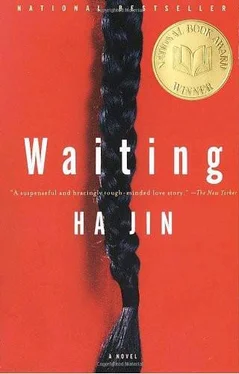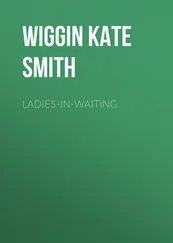Before departing for the border, Commissar Wei had the hospital informed that he would be delighted to meet Manna Wu on Tuesday evening at the army's hotel in Muji City. The hospital leaders told Manna to get ready as soon as possible, since it was already Monday.
She was granted leave the next day. Because she would have to wear her uniform, there wasn't much to prepare. All she did was take a hot bath in the bathhouse and lie in bed for almost the whole afternoon, trying to get some sleep. She felt nervous, as if she were going to sit for the exam on the history of international proletarian revolutions that the hospital gave its staff annually. Yet there was neither the pounding of the heart nor the tightening of the chest as she had experienced long ago with Mai Dong and Lin Kong.
Despite making an effort to rest, she could not set her mind at ease, because she didn't know how she would get downtown in the evening after the bus service had stopped. She could walk but it would take at least an hour, and she might be sweating on arrival at the hotel. She didn't know how to ride a bicycle. If only she had dared to ask the leaders to assign an automobile to drive her there. She regretted not having listened to Lin the previous summer when he had offered to teach her how to bicycle.
After dinner, she put on a pair of patent-leather sandals. They were the only thing she could add to the uniform, but the shoes did make her appear taller and gave a touch of elegance to her carriage. She remembered that when she was a little girl, she had often dreamed of wearing a flowered blouse, fluffy and flossy, which made her look like a butterfly fairy and enabled her to soar into the clouds whenever she ordered, "Fly." In her heart of hearts she still cared very much for colorful clothes, though she understood it was inappropriate to wear them at her age.
She was wondering whether she should set out on foot, wearing a pair of sneakers and carrying the sandals in her satchel so that she could wear them for the meeting. As she was brushing her teeth, a jeep with a large fog light on its front arrived. The leaders had made arrangements for her transportation, but they hadn't told her.
With Manna on board, the jeep rolled out of the front gate and turned townward. The army hotel was at the west end of Glory Street, an area that used to be a red-light district. It occupied a black brick building that fifty years ago had been a Japanese brothel whose owner wouldn't take Russian rubles, which were in circulation together with Chinese yuan at the time. He would charge a Chinese customer double the price, even though most of the prostitutes were Korean women pretending to be Japanese ladies. It was the rush hour, and the street was crowded with bicycles. At a crossroads a beefy policeman was shouting at the cyclers through a megaphone and wielding a white zebra-striped truncheon to direct the traffic. The smell of roast mutton and stewed turnip hovered in the air.
The jeep dropped Manna at the front entrance to the hotel and pulled away. For a moment she worried about how to return to the hospital, then she dismissed the thought, feeling certain she could walk back. She wasn't afraid of dark streets, though the sandals might not give her an easy time. A soldier at the front desk told her that the commissar was expecting her in Suite 6 on the second floor. She thanked him and turned to the stairs. Somehow she felt unusually calm.
An orderly answered the door and led her into the living room. She was struck by his young face, his upper lip not downy yet. He couldn't be older than sixteen. After pouring her a cup of jasmine tea, he said, "Commissar Wei will be with you in a minute." Then he quietly withdrew.
Sitting on a sofa with her legs crossed at the knees, she looked up at the whitewashed wall, on which hung a portrait of Chairman Mao — a tall, thirtyish man in a blue cotton robe and with an umbrella under his arm, trudging up a mountain trail toward a coal mine to mobilize workers. She looked around and noticed that the room was much smaller than a living room in a modern hotel. Then she heard a noise and turned. In came a tall man, smiling and nodding as he walked up to her.
"You must be Comrade Manna Wu," he said and stretched out his hand.
She stood up and said, "Yes." They shook hands; his palm was as soft as though gloved in silk.
He told her, "I'm Guohong Wei. Very happy to see you. Sit down please. "
The commissar's natural manners put her at ease. After he sat down, he began asking about her work and the city. He made no inquiries about her family and hometown. She realized that he must have read her file and knew she had grown up as an orphan. Wear ing a white shirt, he looked more like a professor than an officer, smiling kindly all the time. Half of his hair was gray, and his face was round and flabby, somewhat incongruous on his large, sturdy body. She noticed one of his eyes was larger than the other one. He reminded her of a gentle giant cat.
Though she dared not ask any questions and had to answer him all the while, she didn't feel uncomfortable with this man, who was amiable, without any superior airs. More amazing, he listened to her attentively and nodded his head now and then. Never had she met a man who was such a good listener. She couldn't help wondering why he and his wife had gotten divorced. It seemed he must have been a considerate husband.
He took out a gilt cigarette case from his pocket and asked, " May I?"
She was surprised because no man had ever been so polite to her. "Of course. I like the smell of tobacco." She told him the truth. In fact she herself would smoke one or two cigarettes when she was depressed. In her bedside cupboard there was always a pack, which would last a year.
"Do you smoke?" he asked.
"Not really."
"That means you smoke?"
"No…yes," she said, hesitating over her words. "I smoke only on some occasions." His cigarette gave off a minty, sweetish scent. She wondered what brand he was smoking.
He said, "I see, you smoke when you are bored?"
"Yes, a few times a year."
"What can you do for fun in the hospital?"
"I go to the movies sometimes and also read magazines."
"Do you like reading books?"
"I read books sometimes."
"What have you read lately?" He flicked the burned tip of the cigarette over an ashtray. His hand was large and pinkish, with swollen veins.
The question caught her off guard. For a moment she didn't know how to answer, because she hadn't read a book from cover to cover in recent years. Then she remembered those novels from Lin's library she had looked through long ago. She managed to reply, "I don't read a lot now, I'm too busy. But I used to read fiction."
"Such as?"
"Red Crag, And Quiet Flows the Don, Anna Karenina, The Vanguards… " She paused and regretted having blurted out those titles, particularly the two Russian novels, which were no longer popular and probably unhealthy or pernicious.
"Good, those are excellent books." His eyes brightened as a thrill surged in his voice. "I can see you have good taste. I wish more people read those great Russian novels nowadays. How I used to devour them when I was a young man."
She was pleased by his praise, but too shy to say more.
"Let me show you what I've been reading." He turned and drew a yellowish book from his leather briefcase. "Have you heard of Leaves of Grass?" He raised the book to display the front cover, on which a lean foreign man in a tilted hat stood with one arm akimbo, the hand almost invisible, while his other hand was in his trouser pocket, as though he were trying to conceal his hands.
"No, I've never heard of it. Who wrote it?"
"Walt Whitman, an American poet. This is a remarkable book of poetry, and the poems are so robust and brave they include everything. In a way they form a universe. I've read this book four times."
Читать дальше











